- Home
- Craig Lancaster
The Fallow Season of Hugo Hunter Page 12
The Fallow Season of Hugo Hunter Read online
Page 12
But still, I could have knocked him out earlier, when the end of the round wasn’t so imminent. I could have played it safe, not pressed, and taken a decision that was surely mine. There were things I could have done.
Mostly, I object to snakebit because no athlete wants to think he doesn’t have control of everything in the field of play or, in my case, in the squared circle. To admit that you’re powerless against your circumstances goes against everything you’ve worked for and the considerable sense of self required to get in there and trade punches with another man.
Interestingly enough, submitting to a higher power and admitting my weaknesses is the only way to stay even in a fight against the toughest opponent I’ve ever known.
It’s a continual chore to reconcile those contradictions.
24
Hugo had one thing right in that mess of lies he told William Pennington at Feeney’s: if he’d come to a different end against Rhys Montrose in London, the landscape of his life would look different today. I’ve seen enough in my time to not be too confident about whether it would be better or worse—worse, perhaps, given how self-destructive Hugo could be even without the money and fame that would have come with a world title—but I’m all in on different.
The hell of it is that Hugo had never been better or sharper. Squeaky and Frank took him to the cabin on Flathead Lake in the summer of 1997 and set to carving out the best version of Hugo. He spent July through September up there, chopping wood, running on mountain trails, sparring. By the time camp broke, he stood at his mandated 147 pounds, but the distribution was different—hips narrowed, shoulders broadened, more power rippling through the core of him. If there’s any such thing as an indestructible boxer, we had it that summer in Hugo. He was a piece of iron, impossible to bend. Frank broke camp a day earlier than planned, partly to account for the cross-Atlantic trip that awaited, and partly because, in his last sparring session, Hugo was untouchable. That last word is a sports writing crutch, but in this case, I mean it literally: Dave Runson, a good fighter in his own right, a guy who got into the lower half of the welterweight rankings, could not land a punch on Hugo. All summer, he’d been mimicking Montrose—the upright, move-ahead style, the sticking left jab, the overhand right that was the Brit’s only power punch. By summer’s end, Hugo had him locked down. There’d be the jab—stick, stick, stick, stick, finding only Hugo’s gloves—and then the right would come, and Hugo would already be gone, slipping to the side and digging hooks to Runson’s body.
When we boarded the plane in Billings, bound for Minneapolis and then JFK and, finally, Heathrow, I’d begun to see the wisdom in Frank’s grow-him-slowly approach to Hugo’s career. At twenty-two, Hugo was a full-on man and a full-on wrecking machine, and Frank probably figured that the extra helping of rage Hugo felt at having to wait so long would only help matters. I almost felt sorry for Montrose, who had no idea what was coming for him.
We touched down in London on October 5, seven days before the fight, to give Hugo a chance to acclimate to the difference in time and place, and to allow for the promotional responsibilities he faced. That was the part Frank barely tolerated—the endless on-camera interviews and pushy fans and set pieces engineered by the fight promoters—but Hugo, as always, lapped it up. He wasn’t quite the curiosity he’d been the last time he was in Europe, no longer the soft-featured kid with the killer name and the dashing ring style. The name still stuck, of course, and the manner inside the ropes had grown even more devastating, but hardness had set into the face. Hugo looked like a guy you wouldn’t want to tangle with, right up until he started talking, and then you belonged to him. Flames sprung up behind his eyes, his mouth lifted at the corners, and he’d turn so engaging, regardless of subject, that a room full of journalists would feel as though he were speaking only to each one of them.
Our flight landed in the early morning hours, but we still faced a scrum of cameras as we moved out of customs. Hugo signed a few autographs while Squeaky minded crowd control.
We at last fell out into the street. Rainwater collected in great puddles on the asphalt, a harbinger. It rained every day we were there, a persistence of water that cast a gloomy pall over London day and night, filling our senses. The limo driver, a puff pastry of a man, greeted us and loaded the bags into a bottomless trunk.
I hadn’t slept much on the flights. I was a white-knuckle flyer, truth be told—too pragmatic not to do it and too damned scared to relax—and had stayed up for long stretches, reading the Richard Hugo book of poetry that Hugo had slipped me before we took off in Billings. I’d been so moved by the gesture, and it’s hard to talk about the why of that even now. I felt as though Hugo—our Hugo—was sharing with me some intrinsic part of him, this poet who’d unknowingly given him a name, the mother many years dead who had looked into his eyes and seen a world in verse.
Somewhere over the Atlantic, I read “Farmer, Dying,” and I cried there in my seat, Squeaky asleep next to me, Frank and Hugo in slumber in the row ahead.
It’s hard to remember now exactly why it caught me the way it did and leveled me right there in business class. I thought of my old man, who left the farm in Carbon County to come to Billings—a small town by the world’s reckoning, a metropolis to any rural Montanan. He never talked much about it, but the lines I read between had been visible enough. Dad was the only son of his own parents, and his leaving had sealed the deal. The farm passed on when they did. Another light went out.
It wasn’t just the literal parallels. A sense of leaving pervaded that trip. I’d walked out of my own house with an admonition to Von to mind his mother if he couldn’t find the respect to listen to me, another hectoring of the boy that lives on in my head, ready to taunt me at random. Hugo and Seyna were divorced—her father had pushed for annulment, a bridge too far by Hugo’s estimation, because you can’t annul a kid—but still squabbled over little Raj. Even Squeaky had pulled himself away from a new wife and a house he was building in the hills east of town. The house that Hugo built.
We’d all calibrated our own lives to this moment for Hugo, and we all expected transcendence. In retrospect, that was probably unfair, both the expectation and how we came to it. Hugo was just a man, susceptible to the fall like anybody else. And what right did we have to claim intrusion on our own lives when we so readily attached ourselves to his? Nobody made us do that. We went along willingly. Eagerly.
Wembley Stadium—the old beast, not the new one that stands in London now—hulked on the horizon, dark and menacing. As we drew closer, the banners, fifty feet high at least, revealed themselves. Hugo, right hand cocked, staring down at us, green eyes boring in. Montrose, standing at an angle, proper and prim. They hung off the top of the stadium and unfurled toward the ground.
The driver brought down the partition. “Impressive, aren’t they?”
Hugo leaned in. “What do you think of Montrose?”
“He’s a good bloke.”
“But as a fighter?”
“He’s a good bloke.”
Hugo laughed and fell back into his seat. “Diplomatic,” he said.
The driver tossed a quick look back at us and then put his attention on the road. Our hotel loomed. “If you don’t mind my saying so, sir, we’re all keen on Rhys.”
“As you should be,” Hugo said.
“It’s just that a boxing champion is special to us. We don’t get many of them.”
I looked at Hugo. He smiled like a cat.
“I understand that,” he said. “I’m still gonna kick his ass.”
It was unusual talk for Hugo. Sure, he could trash talk with anybody—taunting Juan Domingo in Spanish perhaps the most prominent example—but he tended not to carry it out in public forums in such a blunt way. He knew the game. He’d talk up his chances to the press, go chin to chin with an opponent at a weigh-in, that sort of thing. But he wasn’t braggadocious, and he didn’t set out to e
mbarrass anybody anywhere but in the ring.
The London trip was different. The gauntlet of cameras at the airport, the limo driver, people on the street who approached him—Hugo told them all, in indelicate terms, that he was there to lay a whupping on Rhys Montrose. It did not go over well with the stiff-upper-lip British. The Guardian called him an ugly American, and an unoriginal one at that, saying John McEnroe twenty years earlier had brought a better brand of brattiness to these shores. Montrose, a lower-middle-class kid from Stoke Newington who’d made up for a lack of artistry with superior craftsmanship, opted against matching Hugo’s rhetoric. “He can say what he wants, but I’m the one with the belt.” It played well with the folks at home, but it didn’t exactly set SportsCenter afire.
The night of the weigh-in, after Hugo had come in at 147 pounds and then invited Montrose to go at it right there for free, I sat on a pub stool with Frank and asked what in the blue blazes was going on with his guy.
“I figure it’s nerves,” he said, staring into his half-empty glass.
I studied Frank’s face. His jaw throbbed from the grinding of his teeth. Nerves, my ass.
“What’s he got to be scared of? This guy’s a cream puff.”
“I didn’t say scared,” Frank said, pouncing on my words like a dog attacking a pork chop. “That’s your word, not mine. I said nerves.”
“Come on, Frank.”
He drained the last of his beer. “It’s nerves. It’s that simple. He’s waited a long time for this—too long, he says—and he’s overcompensating. Once he gets in there tomorrow night and works up a sweat, he’ll be fine. I gotta go.”
The hotel room phone woke me just after four in the morning on fight day. I’d been cascading through a pleasant dream—one long lost to me now—and the ringing sent me headlong into the black-gray of awakening.
I picked up, my heart kicking in from fear. Had something happened back home?
“Yes?”
“Mark.”
Hugo.
“What the hell?” I said.
“You gotta come get me.”
I tried to sweep away the remnants of sleep still sandbagging me. “What? Where are you?” Seven hours earlier, I’d been there for bed check. I’d watched him and Frank say their goodnights as Hugo sat down to a New York strip steak. The weigh-in attained, he was now adding back protein and carbs to fortify himself for the battle ahead.
“I have no fucking idea,” Hugo said. “Somewhere in East London, I think. We crossed the river. There’s all these flowers around.”
“Flowers?”
“Fucking plants, man. Flowers. Petals and shit. All these people setting up booths and flowers.”
“Where are you calling from?”
“A phone booth.”
“Step out and ask somebody where you are. Jesus, Hugo, why aren’t you upstairs in bed?”
A primal scream came back at me. “I’m standing here staring at my picture in the newspaper. I am not fucking getting out of this phone booth and talking to anybody. You come get me right fucking now. East London. Shitload of flowers. Figure it out, Mark.”
“I’ll get Frank.”
“No! No. Do not get Frank. You come alone. Come get me, please.” I swear to God, Hugo started crying right there on the phone. “Come get me.”
“OK. Hang tight. I’ll find you.”
The connection went dead. I got my ass moving.
The concierge called a cab for me, and when I told the driver that my friend was somewhere in East London with a lot of flowers, he said, “Columbia Road,” as if it were the simplest thing in the world, like telling me the time and the temperature.
Even in the dark and the rain, with few other cars on the road, the drive took nearly fifteen minutes. I stared out the window at the passing buildings and watched the first hint of daylight scratch at the sky. The driver minded his business, and for that I was thankful. He no doubt figured that an early, frantic ride to a place I was only guessing at didn’t portend anything good.
The driver made a turn and the headlights flashed on a phone booth. “That your friend?” he said. Hugo was unmistakable. He wore the same button-front shirt and slacks he’d had on at the final press conference for the fight. He cowered as the lights fell on him.
“Wait here,” I told the driver, and I scrambled out of the car and over to the phone booth.
I took off my jacket and gave it to Hugo. “Put this over your head.”
I led him to the car, and we climbed in.
“Everything all right?” the driver asked.
“Yeah, fine,” I said. “He got into a little scrap.”
“Need a hospital?”
“No, just take us back.”
The cabbie backed up. As he turned and looked through the rear window at his progress, I watched the Columbia Road vendors and their incessant motion, scurrying about as their stands took shape. Flowers of every color and size you can imagine, and a few you can’t, filled in the open spaces and cast shadows like monsters on the buildings that lined the street, lit up by the headlights.
And then, just like that, we turned and darkness fell on Columbia Road again.
It was as if we’d never been there.
It all spilled out upstairs, in Hugo’s room, the whole sordid mess.
“I couldn’t sleep,” he said. “I went for a walk.” The walk, he said, led to a pub that led to a table full of young Englishmen, which led to a late-night car ride, which led to a dank basement on Columbia Road.
“And you’ve been doing cocaine,” I said.
“No.” The single word was meek, halfhearted.
“The ring around your nostril says yes.”
A thumb and forefinger flew to his nose, grasping it. He rushed into the bathroom. I badly wanted to follow and start in on him, but I stood my ground.
“Shit,” he said from the bathroom. Running hot water blew whispers of steam into the room. “OK, this is OK, this is going to be OK.”
“Hugo—”
“If I can just get some sleep, I’ll be all right. This is nothing.”
“What about the drug test?” I called in to him.
“Already had it. Passed. I’m good.”
I walked to the entryway. Hugo had his shirt off and his face lathered. He scrubbed at it with his hands.
“Jesus, man, don’t you read your own contracts?”
A sideways glance found me in the mirror. “What?”
“Drug tests before and after, Hugo. You’re screwed. You are so unbelievably screwed. Even if you win, you’re gonna lose. Cocaine stays in your system, what, three days? Four? It doesn’t matter. You’re screwed.”
I don’t think anyone ever hit him with a heavier punch. Hugo shut off the water. He took a towel and cleared the soapy residue from his face. He walked toward me, and I vacated the doorway so he could pass. At the end of the bed, he dropped anchor and sat, silent.
I approached on tentative feet. “Let me go get Frank,” I said, soft and low. “Maybe he can figure a way out of this.”
“No.”
“Hugo—”
“No.”
“He’s gotta know.”
“He can never know about this.”
I stood there, tried to think of an angle I could take that would make Hugo see what he needed to see. He stood and undressed. One by one, the buttons came undone on his shirt, and he tossed it to the floor. He shimmied out of his slacks and piled them up, too. Socks came off and were balled up. He went to the dresser, opened a drawer, and removed a pair of gym shorts and a T-shirt. He climbed into those.
Now he walked past me, toward the bathroom.
“Listen—” I said. He didn’t stop.
I don’t know how to explain the next part. Something deep and compulsive, something I couldn’t ignore, m
oved me toward the bathroom. Fear. Foreboding. Whatever you want to call it, I felt as though I had to be there.
Hugo sat on his knees on the marble floor. A towel encased his right arm, held at an acute angle above his head. In his mouth was a balled-up washcloth.
“No!”
Hugo closed his eyes and crashed his hand against the floor like a pile driver. The snap of the bone was sickening, and his neck and face and eyes bulged red, the washcloth holding his scream in. He toppled over onto the floor.
I ran to him and fell to my knees at his side. I cradled his head and removed the washcloth from his mouth. Tears ran from his eyes to my lap in broken-dam rivulets. His right arm twisted beneath him, still wrapped in the towel, at a grotesque angle.
“Are you stupid?” I said.
Hugo’s words came in gasps. “Help me up.”
I climbed to my feet and lifted him with me, but I nearly went down again when I saw the arm, now freed from the towel. A bone, gray-yellow, poked from the flesh. The towel lay at our feet, soaked with blood.
“Take me to the bed,” Hugo said.
I maneuvered him as best I could, each movement putting stress on his injury. He gritted his teeth to hold back a scream.
“Hand me the phone.”
I complied, setting the receiver against his shoulder while he trapped it with his head. I didn’t want to, but my eyes kept returning to the jutted bone that pierced his skin. “Jesus, Hugo.”
Hugo looked up at me, fingers from his good hand reaching for the phone’s buttons. “You better get out of here now.”
25
Lainie stood at the stove and beat eggs into submission. I sat across from her in Delmar’s terry cloth robe, still a bit uncomfortable in it even though she had insisted that it was fine, her pragmatic assertion being that Delmar, two years dead of cancer, wouldn’t need it anymore. Modesty won out over discomfort, I suppose. My only other choice was to sit there naked. I’m not into crimes against humanity.

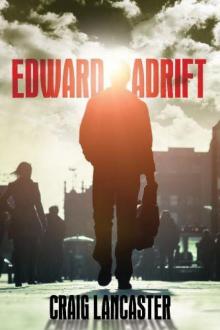 Edward Adrift
Edward Adrift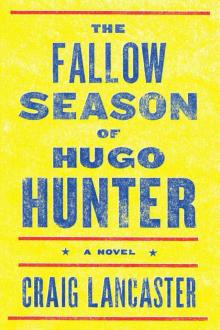 The Fallow Season of Hugo Hunter
The Fallow Season of Hugo Hunter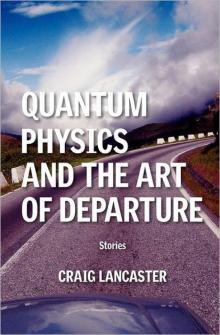 Quantum Physics and the Art of Departure: Short Shories
Quantum Physics and the Art of Departure: Short Shories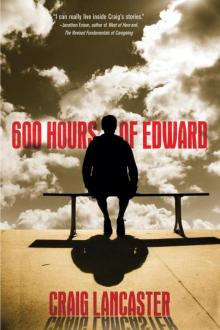 600 Hours of Edward e-1
600 Hours of Edward e-1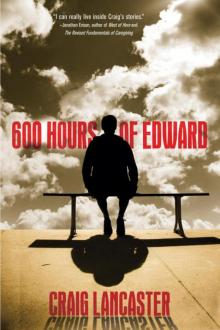 600 Hours of Edward
600 Hours of Edward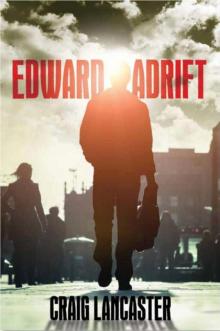 Edward Adrift e-2
Edward Adrift e-2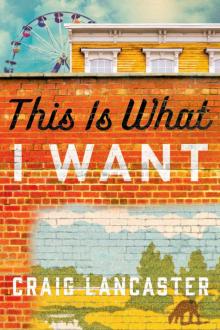 This Is What I Want
This Is What I Want